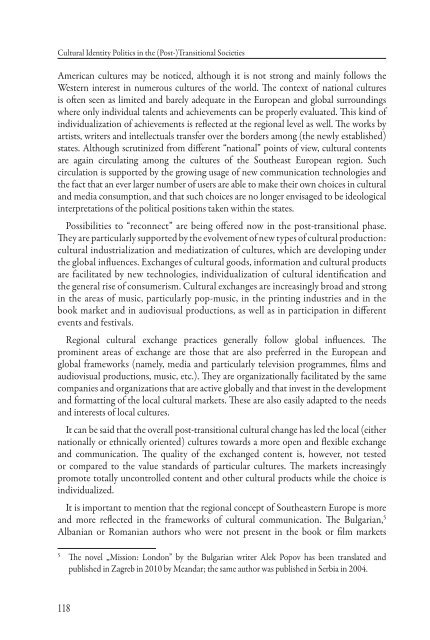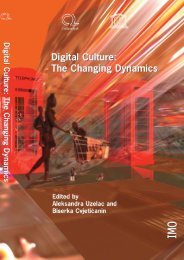free download in pdf format - Culturelink Network
free download in pdf format - Culturelink Network
free download in pdf format - Culturelink Network
You also want an ePaper? Increase the reach of your titles
YUMPU automatically turns print PDFs into web optimized ePapers that Google loves.
Cultural Identity Politics <strong>in</strong> the (Post-)Transitional Societies<br />
American cultures may be noticed, although it is not strong and ma<strong>in</strong>ly follows the<br />
Western <strong>in</strong>terest <strong>in</strong> numerous cultures of the world. Th e context of national cultures<br />
is oft en seen as limited and barely adequate <strong>in</strong> the European and global surround<strong>in</strong>gs<br />
where only <strong>in</strong>dividual talents and achievements can be properly evaluated. Th is k<strong>in</strong>d of<br />
<strong>in</strong>dividualization of achievements is refl ected at the regional level as well. Th e works by<br />
artists, writers and <strong>in</strong>tellectuals transfer over the borders among (the newly established)<br />
states. Although scrut<strong>in</strong>ized from diff erent “national” po<strong>in</strong>ts of view, cultural contents<br />
are aga<strong>in</strong> circulat<strong>in</strong>g among the cultures of the Southeast European region. Such<br />
circulation is supported by the grow<strong>in</strong>g usage of new communication technologies and<br />
the fact that an ever larger number of users are able to make their own choices <strong>in</strong> cultural<br />
and media consumption, and that such choices are no longer envisaged to be ideological<br />
<strong>in</strong>terpretations of the political positions taken with<strong>in</strong> the states.<br />
Possibilities to “reconnect” are be<strong>in</strong>g off ered now <strong>in</strong> the post-transitional phase.<br />
Th ey are particularly supported by the evolvement of new types of cultural production:<br />
cultural <strong>in</strong>dustrialization and mediatization of cultures, which are develop<strong>in</strong>g under<br />
the global <strong>in</strong>fl uences. Exchanges of cultural goods, <strong>in</strong><strong>format</strong>ion and cultural products<br />
are facilitated by new technologies, <strong>in</strong>dividualization of cultural identifi cation and<br />
the general rise of consumerism. Cultural exchanges are <strong>in</strong>creas<strong>in</strong>gly broad and strong<br />
<strong>in</strong> the areas of music, particularly pop-music, <strong>in</strong> the pr<strong>in</strong>t<strong>in</strong>g <strong>in</strong>dustries and <strong>in</strong> the<br />
book market and <strong>in</strong> audiovisual productions, as well as <strong>in</strong> participation <strong>in</strong> diff erent<br />
events and festivals.<br />
Regional cultural exchange practices generally follow global <strong>in</strong>fl uences. Th e<br />
prom<strong>in</strong>ent areas of exchange are those that are also preferred <strong>in</strong> the European and<br />
global frameworks (namely, media and particularly television programmes, fi lms and<br />
audiovisual productions, music, etc.). Th ey are organizationally facilitated by the same<br />
companies and organizations that are active globally and that <strong>in</strong>vest <strong>in</strong> the development<br />
and <strong>format</strong>t<strong>in</strong>g of the local cultural markets. Th ese are also easily adapted to the needs<br />
and <strong>in</strong>terests of local cultures.<br />
It can be said that the overall post-transitional cultural change has led the local (either<br />
nationally or ethnically oriented) cultures towards a more open and fl exible exchange<br />
and communication. Th e quality of the exchanged content is, however, not tested<br />
or compared to the value standards of particular cultures. Th e markets <strong>in</strong>creas<strong>in</strong>gly<br />
promote totally uncontrolled content and other cultural products while the choice is<br />
<strong>in</strong>dividualized.<br />
It is important to mention that the regional concept of Southeastern Europe is more<br />
and more refl ected <strong>in</strong> the frameworks of cultural communication. Th e Bulgarian, 5<br />
Albanian or Romanian authors who were not present <strong>in</strong> the book or fi lm markets<br />
5 Th e novel „Mission: London” by the Bulgarian writer Alek Popov has been translated and<br />
published <strong>in</strong> Zagreb <strong>in</strong> 2010 by Meandar; the same author was published <strong>in</strong> Serbia <strong>in</strong> 2004.<br />
118



